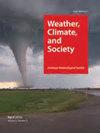Effects of temperature and air pollution on emergency ambulance dispatches: a time series analysis in a medium-sized city in Germany
IF 1.9
4区 地球科学
Q3 ENVIRONMENTAL STUDIES
引用次数: 0
Abstract
Management of adverse health related effects from heat waves requires comprehensive and accessible sources of information. This paper examines the effects of temperature and air pollution on human health and identifies areas with increased occurrence of emergency ambulance dispatches in the city of Würzburg, Bavaria, Germany and discusses the applicability for health care interventions and urban planning. An over-dispersed Poisson generalized additive model was used to examine and predict the association and potential lag of exposure between temperature, air pollution and three types of emergency ambulance dispatches during the study period from 2011-2019. A linear model was used to estimate heat-wave effects. A line density function was used to identify areas with increased occurrence of dispatches. Significant effects of temperature were detected for non-traumatic and cardiovascular diseases after exceeding a threshold temperature. The exposure-response relationships showed an increased relative risk up to two days after exposure for non-traumatic and cardiovascular diseases. Results indicate a significant association between presence of heat waves and cardiovascular diseases with up to 17% (CI 95%: 5.9% -30.0%) increased relative risk on a heat wave day compared to a non-heat wave day. Dispatches for cardiovascular diseases occur more often in areas with a high population and building density, especially in summer. The analyses identified hotspots of heat-related dispatches in areas with increased population and building density and provides baseline information for interventions in future urban planning and public health care management based on data commonly available even in small cities.温度和空气污染对急救车调度的影响:德国一个中等城市的时间序列分析
管理热浪对健康的不利影响需要全面和可获取的信息来源。本文研究了温度和空气污染对人类健康的影响,并确定了德国巴伐利亚州维尔茨堡市紧急救护车调度增加的地区,并讨论了卫生保健干预和城市规划的适用性。在2011-2019年的研究期间,使用过分散泊松广义加性模型来检验和预测温度、空气污染和三种类型的紧急救护车调度之间的联系和潜在的暴露滞后。使用线性模型来估计热浪效应。线路密度函数用于识别调度发生率增加的区域。在超过阈值温度后,检测到温度对非创伤性和心血管疾病的显著影响。暴露-反应关系显示,暴露后两天内,非创伤性和心血管疾病的相对风险增加。结果表明,热浪的存在与心血管疾病之间存在显著关联,与非热浪日相比,热浪日的相对风险增加了17%(CI 95%CI:5.9%-30.0%)。心血管疾病的调度更经常发生在人口和建筑密度高的地区,尤其是在夏天。这些分析确定了人口和建筑密度增加地区与高温相关的调度热点,并根据小城市常见的数据为未来城市规划和公共卫生保健管理的干预措施提供了基线信息。
本文章由计算机程序翻译,如有差异,请以英文原文为准。
求助全文
约1分钟内获得全文
求助全文
来源期刊

Weather Climate and Society
METEOROLOGY & ATMOSPHERIC SCIENCES-
CiteScore
3.40
自引率
13.60%
发文量
95
审稿时长
>12 weeks
期刊介绍:
Weather, Climate, and Society (WCAS) publishes research that encompasses economics, policy analysis, political science, history, and institutional, social, and behavioral scholarship relating to weather and climate, including climate change. Contributions must include original social science research, evidence-based analysis, and relevance to the interactions of weather and climate with society.
 求助内容:
求助内容: 应助结果提醒方式:
应助结果提醒方式:


